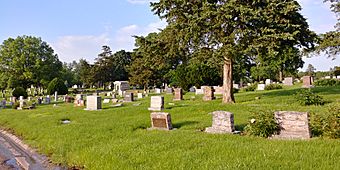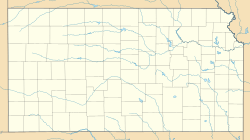Oak Hill Cemetery (Lawrence, Kansas) facts for kids
Quick facts for kids |
|
|
Oak Hill Cemetery
|
|
 |
|
| Location | 1605 Oak Hill Avenue, Lawrence, Kansas |
|---|---|
| NRHP reference No. | 100001287 |
| Added to NRHP | July 10, 2017 |
The Oak Hill Cemetery is a special place in Lawrence, Kansas. It is a cemetery, which is a quiet area where people are buried. This cemetery was first started to remember those who died during a difficult time in Lawrence's history.
Many important people from Kansas are buried here. These include Charles L. Robinson, who was the first governor of Kansas. Also buried here are John P. Usher and James H. Lane, who were both important figures in Kansas history. The cemetery was built in 1866.
Contents
What is Oak Hill Cemetery?
Oak Hill Cemetery is a large, peaceful place. It is located in the city of Lawrence. People visit cemeteries to remember loved ones. They also learn about the past. This cemetery holds many stories from Kansas history.
A Place of History
The cemetery was created in 1866. This was soon after the American Civil War. It was especially important for remembering people killed in Quantrill's Raid. This raid was a surprise attack on Lawrence in 1863. Many people in the town lost their lives. The cemetery became a way to honor them.
Remembering Important People
Many famous people from Kansas are buried at Oak Hill.
- Charles L. Robinson was the very first governor of Kansas. He helped lead the state when it was new.
- John P. Usher was also a key person in early Kansas politics. He served as a U.S. Representative.
- James H. Lane was a U.S. Senator. He was also a general during the Civil War. These individuals shaped the early history of Kansas.
Why is it a Historic Place?
Oak Hill Cemetery is more than just a burial ground. It is listed on the National Register of Historic Places. This means it is a very important site for history. It helps us understand the past of Lawrence and Kansas. The cemetery shows how the community remembered its history. It also shows how it honored those who came before.
 | Jewel Prestage |
 | Ella Baker |
 | Fannie Lou Hamer |


